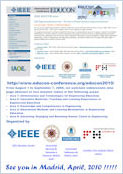
Call for Papers
1 page flyer, PDF
As a result of this, educational approaches have changed over the last century from remedial repetitive learning to todayís learning, which focuses on acquiring an understanding of how to become more independent in the learning process. Learning is no longer concentrated mainly in the first stages of human life through formal education and specific training in business, but it becomes a day-by-day routine over a humanís life cycle. This situation requires new forms and channels in the learning process. Additionally, modern learning approaches must account for social and cultural aspects as well as the individualís profile including task and role-based aspects, interests, knowledge state, short-term learning objectives and long-term career goals. Thus processing and acquiring knowledge is a key to a modern learning pedagogy, but also content creation, collaboration and community-based practice for knowledge and skills development are important success factors.
The IEEE EDUCON conference will attract 200+ participants from all over the world and will provide an interdisciplinary forum for academic, research and industrial collaboration on teaching methods, practical experiences and research towards the future of global Engineering Education.
We invite submissions of papers in the categories of: research, development, evaluation and best practices that deal with learning Engineering Education in academic, organizational, and life-long learning settings including, but not limited to the following areas and topics.